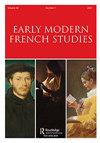‘Cet autre moy’: Poetic Selves and Anterotic Friendships in Sixteenth-Century France
IF 0.2
3区 历史学
Q2 HISTORY
引用次数: 1
Abstract
This article begins by considering a Complainte by the poet Philippe Desportes (1581) which contains the first recorded use of the substantive ‘self’ in French (‘cet autre moy’). Following Terence Cave (1999), it highlights the fact that it occurs in the context of Renaissance writings on friendship predominantly influenced by the ‘Aristotelian-Ciceronian model’. It proposes that alongside this well-established model of friendship, there is another, competing model, what it terms the ‘anterotic’ model based on the mythological figure of Anteros. The anterotic model is rooted in strife as well as mutuality, and evocatively captures the dynamics of the creation of poetic identity in sixteenth-century French writings, including the fraught relationship between poet and verse, and the struggle between originality, emulation and independence. Seen against this backdrop, the substantive ‘self’ reflects not so much ‘modern’ identity as we know it, but a poetic identity encapsulated in the complex doubleness of Anteros.“Cet autre moy”:16世纪法国的诗意自我与原始友谊
本文首先考虑了诗人菲利普·德波尔特斯(1581)的一篇《抱怨》,其中包含了法语中第一次使用实质性的“自我”(“et autre-moy”)的记录。继Terence Cave(1999)之后,它强调了一个事实,即它发生在文艺复兴时期关于友谊的著作的背景下,主要受到“亚里士多德西塞罗模式”的影响。它提出,除了这种公认的友谊模式之外,还有另一种相互竞争的模式,即基于神话人物安特罗斯的“顺行”模式。顺行模式植根于冲突和相互性,并令人回味地捕捉到16世纪法国作品中诗歌身份创造的动态,包括诗人和诗歌之间令人担忧的关系,以及独创性、模仿性和独立性之间的斗争。在这种背景下,实质性的“自我”反映的与其说是我们所知道的“现代”身份,不如说是一种诗意的身份,这种身份被安特罗斯复杂的双重性所包裹。
本文章由计算机程序翻译,如有差异,请以英文原文为准。
求助全文
约1分钟内获得全文
求助全文
来源期刊

Early Modern French Studies
Multiple-
CiteScore
0.10
自引率
0.00%
发文量
14
期刊介绍:
Early Modern French Studies (formerly Seventeenth-Century French Studies) publishes high-quality, peer-reviewed, original articles in English and French on a broad range of literary, cultural, methodological, and theoretical topics relating to the study of early modern France. The journal has expanded its historical scope and now covers work on the sixteenth, seventeenth, and eighteenth centuries. Within this period of French literary and cultural history, the journal particularly welcomes work that relates to the term ''early modern'', as well as work that interrogates it. It continues to publish special issues devoted to particular topics (such as the highly successful 2014 special issue on the cultural history of fans) as well as individual submissions.
 求助内容:
求助内容: 应助结果提醒方式:
应助结果提醒方式:


